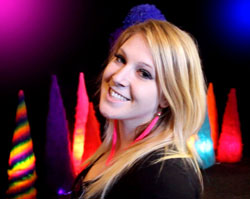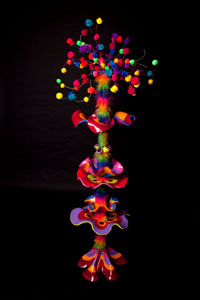Arts Health PhD student knows the benefits of engaging with art
PhD candidate Bliss Cavanagh's Tourette's diagnosis led her to embark on an investigation into the benefits of sensory environments.
 Cavanagh, who is currently completing a PhD at the University of Newcastle (UON) on – Art and Sensory Environments: an exploration of Tourette syndrome and the art of abstract play to enhance mental health and inclusive quality of life – says her interest in this topic grew from her Fine Arts Honours year at UON when she created a multi-sensory art installation called Sensory Overload.
Cavanagh, who is currently completing a PhD at the University of Newcastle (UON) on – Art and Sensory Environments: an exploration of Tourette syndrome and the art of abstract play to enhance mental health and inclusive quality of life – says her interest in this topic grew from her Fine Arts Honours year at UON when she created a multi-sensory art installation called Sensory Overload.
"I embarked on this journey to create my own personal sensory environment," Cavanagh told the Newcastle Post journalist Amelia Parrott. "Everything I was creating using clay and ceramics, soft materials and textures, it was all really therapeutic and I actually found that it really helped to alleviate my tics and nervous tension and other symptoms of Tourette's.
"Once I realised I was helping my Tourette's through my art, it sort of completely transformed me as a person and I became much more confident and was able to really come to terms with it and start creating something much more positive out of the disorder."
 Cavanagh's PhD is being supervised jointly by Associate Professor Carole James and Kirsti Haracz from the School of Health Sciences, and Dr Miranda Lawry – a Senior Lecturer in the School of Creative Arts. Dr Lawry, whose areas of expertise include Arts Health, says there's a growing body of evidence that shows the benefits of patients engaging with art.
Cavanagh's PhD is being supervised jointly by Associate Professor Carole James and Kirsti Haracz from the School of Health Sciences, and Dr Miranda Lawry – a Senior Lecturer in the School of Creative Arts. Dr Lawry, whose areas of expertise include Arts Health, says there's a growing body of evidence that shows the benefits of patients engaging with art.
"Bliss' research represents a new direction for creative arts students who are working at driving specific cross disciplinary engagement with researchers in areas such as health and science to assist in driving arts health research outcomes," said Dr Lawry.
"All of my work is inspired by my personal experience of living with Tourette syndrome," Cavanagh said. "I have become a strong advocate for building positive awareness surrounding Tourette's and through my PhD research I am striving to inspire social change and a shift in mentality around mental health and wellbeing by demonstrating the power of arts to communicate ideas."
Find out More
Contact
- Jessie.Reid@newcastle.edu.au
- Phone: 02 4921 7458
Related news
- University proposes new student accommodation at Callaghan Campus
- University proposes new student accommodation at Callaghan Campus
- Healthy recognition: Dietitian earns prestigious Australian science honour
- Nine Newcastle teams secure $5.4m in ARC Discovery grants to unearth new knowledge
- Nine Newcastle teams secure $5.4m in ARC Discovery grants to unearth new knowledge
The University of Newcastle acknowledges the traditional custodians of the lands within our footprint areas: Awabakal, Darkinjung, Biripai, Worimi, Wonnarua, and Eora Nations. We also pay respect to the wisdom of our Elders past and present.